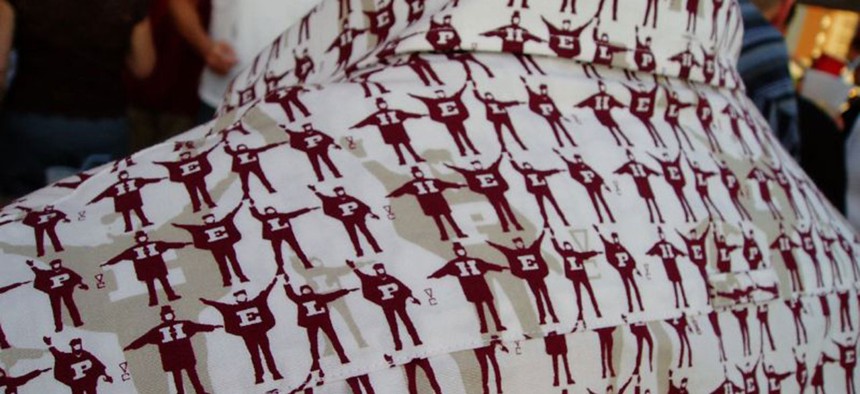
"Help" is not just the name of a Beatles film and album. It's also a word you should stop using in the office. Flickr user Michael Lehet
The One Word Everyone Needs to Stop Using in the Office
You probably say it without even thinking about it.
In the Bible, Eve is created to serve Adam. “It is not good for the man to be alone; I will make him a helper suitable for him,” muses God in Genesis 2:18.
Twenty-first-century office culture is no exception. More than 3,000 years later, the word “help” is used all the time—particularly in reference to the work that women do.
In November, ex-Gawker writer Dayna Evans published a Medium pos talleging insidious sexism at the publication. In a memo announcing the hire of editor-in-chief Alex Pareene, interim editor-in-chief Leah Beckmann’s is characterized in the following way:
Leah Beckmann deserves the gratitude and respect of all of us for stepping up as acting editor-in-chief of Gawker during a goddamned horrible time for the site’s staff….Please thank her for stepping into the breach and helping out.
When a man edits, it’s called work. When a woman does, she’s helping out.
I’ve heard it countless times, even from coworkers I consider attuned to gender equality. Once, as I was leaving a previous job, the CEO sent me an email thanking me for all of my help. It might be a slip of the tongue, but it makes genuine appreciation sound dismissive and a woman’s effort seem quaint.
It’s not just journalism. In February, Adam Grant and Sheryl Sandberg wrote in the New York Times that women often take a gendered role of “office housework” in corporate settings:
This is the sad reality in workplaces around the world: Women help more but benefit less from it. In keeping with deeply held gender stereotypes, we expect men to be ambitious and results-oriented, and women to be nurturing and communal. When a man offers to help, we shower him with praise and rewards. But when a woman helps, we feel less indebted. She’s communal, right? She wants to be a team player. The reverse is also true. When a woman declines to help a colleague, people like her less and her career suffers. But when a man says no, he faces no backlash. A man who doesn’t help is “busy”; a woman is “selfish.”
I’m talking about situations where women are paid for the work they do. I’m all for a spirit of collaboration and generosity. But when it’s in a professional context, “helping” your colleagues or manager or reporters is by definition work.
The words we use matter. And the way we describe work affects how we think about it. Thinking of women’s work as “help” might be one of the reasons with why there’s still a gender pay gap in the US, not to mention severe underrepresentation of women in leadership positions across industries.
As Soraya Chemaly wrote for Quartz earlier this year: “The message that women’s time and work is inherently less valuable than that of their male peers’ is a systemic one.” Do us all a favor and keep thanking colleagues for their work, their ideas, even their attitudes. But never for their help.
(Image via Flickr user Michael Lehet)
NEXT STORY: Once Again, the GS System Is Failing Government






